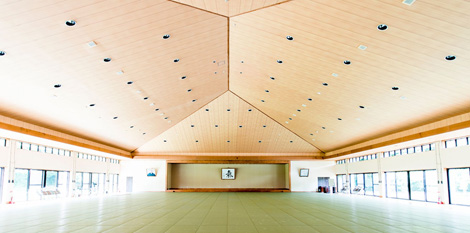One of the things I was trained to do as an Uchideshi (live-in apprentice) was to “impart knowledge”.
What does “impart knowledge” mean?
In a nutshell, to impart knowledge means that the message is getting across to, or understood by, another person. No matter how much we think we successfully imparted knowledge about something, it doesn’t necessarily mean we did so if the message was not getting across to, or understood by, the other person.
We used to hold a class once a week under the guidance of Koichi Tohei Sensei at a large 520-tatami mat dojo in Tochigi Prefecture. The first half of the three-hour class was taught by an Uchideshi.
Uchideshi’s teaching was not evaluated under the watchful eyes of Tohei Sensei. He actually did not see the Uchideshi’s teaching at all. Instead, Tohei Sensei would come at the end of the first half of the class, and ask the students a question.
“Did you all understand what you were taught during the first half of the class?”
The students were adults and polite, so even if they didn’t understand something, they responded, “Yes, we understood”. Koichi Tohei Sensei, then, would say,
“That’s good! Please show me what you learned.”
To “understand” something means we “are able to do” it. If we can’t actually do it, we can’t say we understood it. When the students actually tried to demonstrate what they learned, often times they couldn’t do it.
Then, Koichi Tohei Sensei would gently admonish the Uchideshi.
“This means you really didn’t impart knowledge”.
I myself tried and taught in this class many times, and I was astonished to see the reality that what I was teaching wasn’t really getting through to the students even though I thought I taught very carefully and in detail.
According to the definition / criteria, that “the message is truly getting across to/being understood by someone”, I wasn’t really “imparting knowledge”.
Through trial and error, however, I was gradually able to “get the message across to / understood by” the students [in this class]. And, I learned to always approach other teaching opportunities with the same attitude as well.
This training gave me the foundation for my current position as a leader.
Koichi Tohei Sensei explained that the same attitude is also important in daily life and work.
For example, suppose a supervisor gives work instructions to a subordinate. Most supervisors would blame their subordinate when they don’t get the desired results, saying “I told you that, didn’t I?”
If we are not getting the results we want, it means that our instructions were not conveyed / understood. It is important to see the problem being caused by the person who gave the instructions. We should not hold the other person responsible for the message not being understood.
By focusing on “how to help others understand correctly,” the way we impart knowledge gets better increasingly over time.
It is also very important to see the Ki of the other person.
When a person is busy and gives empty replies, makes assumptions, or does not correctly understand what we are trying to teach, that person is usually sending out Ki that indicates they are not understanding.
If we learn to observe correctly, then we should be able to respond in some ways, such as repeating important information or asking the person to recite it back to us.
The same training can be done when we are in a restaurant.
Sometimes, we might be served a dish that is different from what we ordered. When this happens, we shouldn’t blame the staff for the mistake.
When someone does not correctly understand what we are conveying, that person must be giving some kind of sign at that moment. Missing that sign is the cause of our message not getting across correctly.
If the person imparting knowledge takes responsibility for the outcome of their ability to teach correctly, then they will learn to be more creative, and their ability to communicate will steadily improve.
Let’s strive to master this art.
Translated by Mayumi Case
Edited by David Shaner
Eastern Ki Federation
https://easternkifederation.org/
Original article in Japanese: 「伝える」とは何か “tsutaeru” towa nani ka“
August 1, 2023
https://shinichitohei.com/japanese/04-%e3%83%a1%e3%83%bc%e3%83%ab%e3%83%9e%e3%82%ac%e3%82%b8%e3%83%b3/27739/


